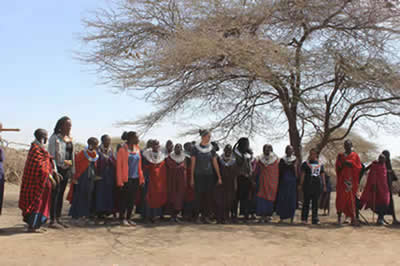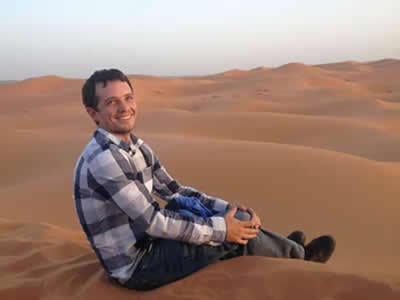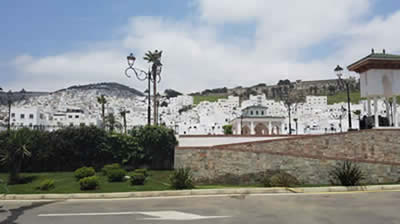
Danielle Mensah, BS, Chemistry, 2017. Fifth from left with fellow study abroad students and a group of Maasai women atOlpopongi Maasai Cultural Village
“Danielle, move over!! We just heard something outside the tent.” I abruptly woke up on the first night of staying at the Ngorongoro safari crater as my two friends squished me on both sides. I laughed and told them, “Mlale!” (you all sleep), as I knew in a few hours we would return on the road to see more of the wild animals in the crater. The next morning, I had quite a funny story to tell at breakfast about my friends crying in my bed because of the fighting zebras. To be fair, they were literally RIGHT outside of our tent. This is one of the many memories and experiences that I was fortunate to have because I participated in Fulbright-Hays GPA. With a diverse cohort of 11 students who came from all over the U.S. we each advanced our Swahili skills as we studied in Moshi, Tanzania. This program really catered to my need because we had an average of two teachers for every three students. Because of the smaller classroom size and our engaging with the Moshi community, I was able to jump from intermediate low to advance levels in two months of extensive Swahili! I appreciate this program because we did classroom activities as well as explore Tanzania to learn more about the culture. My favorite moments of this summer were dancing in a traditional Maasai women welcoming ceremony and FINALLY achieving my travel goal of relaxing on a beach in Zanzibar, Tanzania. Studying abroad long-term can be very difficult, especially if there is a language barrier. I am extremely thankful that my program directors and cohort of students all felt like my family. There were days when I was so frustrated and wanted to go home, but my directors (whom we called our mamas) were always there to encourage and listen to us. We were never alone, and I think that makes all the difference when studying abroad. I would 100% recommend this program to any students who are considering traveling and learning abroad! It is also extremely affordable as traveling can be expensive so take advantage of these opportunities now.
Video:
Matt Hendrick, MA, South Asian and Middle Eastern Studies, just chilling in the desert near Merzouga

Matt Hendrick studied at ALIF (the Arabic Language Institute in Fez) during the summer of 2017. He took six weeks of intensive Darija (the Moroccan dialect of Arabic) courses and three weeks of intensive Qur’anic Arabic courses. In addition to Matt’s learning from ALIF’s excellent intensive language courses, his living in Fez offered numerous opportunities to learn more about Moroccans and Moroccan culture. Matt left Fez far more informed of Moroccan society and with a newfound ability to engage and interact with Moroccans in their own dialect.

Upon returning to the U.S. I found it challenging to readjust to life back at home. There was no fruit stand down the block, where I could get fresh figs and olives, no random conversation with the locals in Arabic. My once daily life in the U.S. was trying to hunt me down and I was still meandering around in my dream land, moseying around with the habits I had created abroad. Being in Morocco, I came to learn more about myself, and every day carried a different experience with it. Our norm was to study Arabic for six hours a day, and then leave Rabat to explore a new city, and a new way of life.
My two months there worked wonders for my Arabic, although I didn’t realize it until I was on the plane back home. When I first arrived, I knew the bare bones of the language, and I was too shy to speak it. However, later on I learned that I just had to go for it. After all, confused looks and hand motions can only get you so far. The classes were a bit challenging at times, but eventually I was able to hold regular conversations; chatting with no hesitation. Whether my speech was grammatically correct or not, it was fun to just speak in Arabic wherever and whenever I could.
I hope I’ll get an opportunity to study abroad again in the future, and continue to improve upon my Arabic.